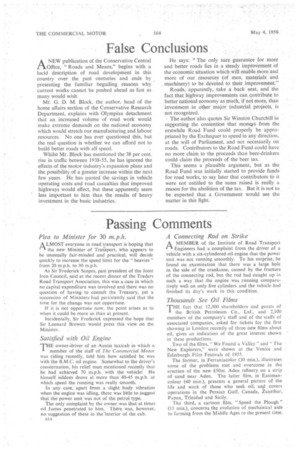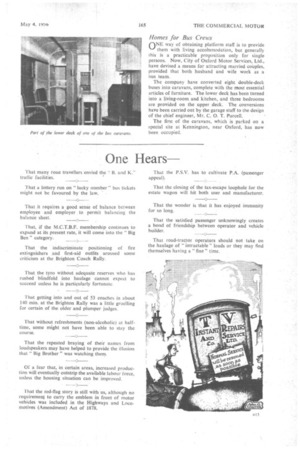Passing Comments
Page 48

Page 49

If you've noticed an error in this article please click here to report it so we can fix it.
Plea to Minister for 30 m.p.h.
ALMOST everyone in road transport is hoping that the new Minister of Transport, who appears to be unusually fair-minded and practical, will decide quickly to increase the speed limit for the " heavies" from 20 m.p.h. to 30 m.p.h.
As Sir Frederick Scopes, past president of the Joint Iron Council, said at the recent dinner of the Traders Road Transport Association, this was a case in which no capital expenditure was involved and there was no question of having to consult the Treasury, yet a succession of Ministers had persistently said that the time for the change was not opportune.
If it is not opportune now, the point arises as to when it could be more so than at present.
Incidentally, Sir Frederick expressed the hope that Sir Leonard Browett would press this view on the Minister. .
Satisfied with Oil Engine
'THE owner-driver of an Austin taxicab in which a I member of the staff of The Commercial Motor was riding recently, told him how satisfied he was with the B.M.C. oil engine. Somewhat to the driver's consternation, his relief man mentioned recently that he had achieved 70 m.p.h. with the vehicle! He himself seldom drove at more than 40-45 m.p.h. at which speed the running was really smooth.
In any. case, apart from a slight body vibration when the engine was idling, there was little to suggest that the power unit was not of the petrol 'type. The only complaint by the owner was that at times oil fumes penetrated to him. There was, however, no suggestion of these in the'interior of the cab.
n14
A Connecting Rod on Strike
A MEMBER of the Institute of Road Transport 1-k Engineers had a complaint from the driver of a vehicle with a six-cylindered oil engine that the power unit was not running smoothly. To his surprise, he found on examination that there was a large hole in the side of the crankcase, caused by the fracture of the connecting rod, but the rod had caught up in such a way that the engine was running comparatively well on only five cylinders and the vehicle had finished its day's work in, this condition.
Thousands See Oil Films
THE fact that 12,300 shareholders and guests of I the British Petroleum Co., Ltd., and 2,100 members of the company's staff and of the staffs of associated companies, asked for tickets for the first showing in London recently of three new films about oil, gives an indication of the great interest shown in these productions. Two of the films, We Found a Valley "and the New Explorers," were shown at the Venice and Edinburgh Film Festivals of 1955.
The former, in Ferraniacolor (30 min.), illustrates some of the problems met and overcome in the erection of the new £50m. Aden refinery on a strip of sand near Aden. The latter film, in Eastmancolour (40 min.), presents a general picture of the life and work of those who seek oil, arkd. covers operations in the Persian Gulf, Canada, Zanzibar, Papua, Trinidad and Sicily.
The third, a cartoon film, "Speed the Plough" (15 min.), concerns the evolution of mechanical aids to farming from the Middle Ages to the present time.
Homes for Bus Crews
nNE way of obtaining platform staff is to provide them with living accoinmodation, but generally this is a practicable proposition only for single persons. Now, City of Oxford Motor. Services, Ltd., have devised a means for attracting married couples, provided that both husband and wife work as a bus team.
The company have converted eight double-deck buses into caravans, complete with the most essential articles of furniture. The lower deck has been turned into a living-room and kitchen, and three bedrooms are provided on the upper deck. The conversions have been carried out by the garage staff to the design of the chief engineer, Mr. C. 0. T. Purcell.
The first of the caravans, which is parked on a special site at Kennington, near Oxford, has now been occupied.




































































































































